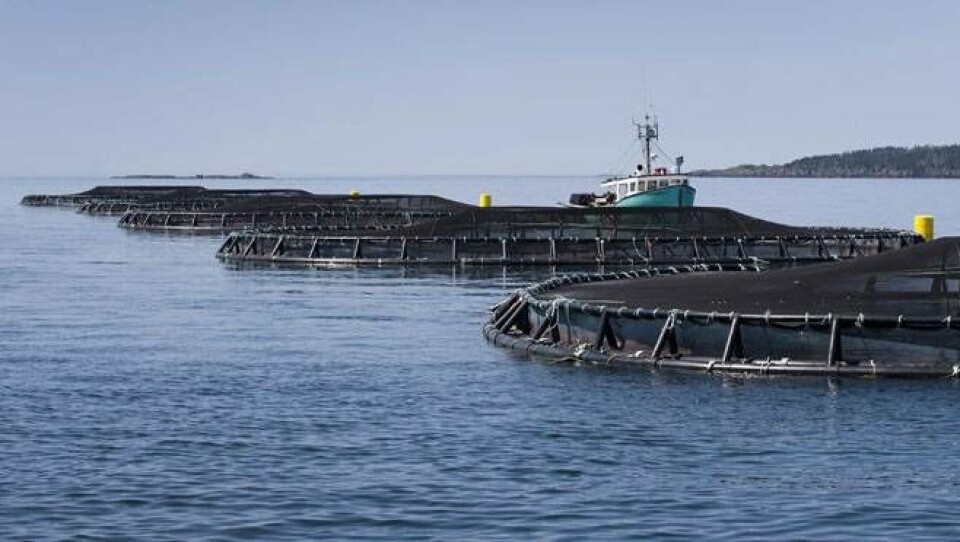
Cooke commits to Nova Scotia as Cermaq turns its back on province
Canadian salmon farmer Cooke has reiterated its intention to expand production in its existing farming areas in Nova Scotia.
It confirmed its commitment to the province on the same day that another salmon farmer, Cermaq Canada, revealed that it was abandoning plans to establish operations there.
Cermaq, which farms in British Columbia, had been granted options to lease by the province but said it had been unable to identify enough sites for the 20,000 tonnes of production it required to make expansion to the Atlantic coast viable.
12 sites
Cooke subsidiary Kelly Cove Salmon Ltd has been operating in Nova Scotia for 22 years and currently runs 12 farm sites on the province’s southern and western shores, producing 8,500 tonnes of salmon annually.
It now hopes to increase operations in those areas after the provincial government lifted a moratorium on salmon farming expansion.
“Our aim is to grow responsibly in Nova Scotia. And this means modest expansion, putting fish health and environmental sustainability at the forefront of our growth strategy,” said Cooke media spokesman Joel Richardson.

Liverpool Bay
He said Cooke had 205 full-time staff in Nova Scotia and the company wanted to make sure local people knew that it was committed to the province.
The company’s immediate focus is on Liverpool Bay, Queens County, in the south of the island, where it already has one farm at Coffin Island that has a capacity of around 400,000 fish.
Cooke wants to add a further six cages to Coffin Island, which would increase capacity to around 600,000.
It also wants to open new 20-cage, 600,000-fish farms at two other Liverpool Bay sites, Brooklyn and Mersey Point.
Food security
Cooke said it believed in taking a coordinated, thoughtful, Bay Management Area (BMA) / Aquaculture Management Area (AMA) approach to expansion without compromising bio-security protocols and without putting the health of fish at risk.
“The current [Covid-19] pandemic situation reminds us all that locally produced food is vital to food security in Canada and we are very proud of all our people working hard in Nova Scotia and throughout the world who are essential to supply grocery stores,” added Richardson.
He pointed out that 309 small and medium sized Nova Scotian businesses are in Cooke’s supply chain and they annually receive orders for over $51 million. Cooke’s annual contribution to the Nova Scotia economy amounts to $239.5m in revenues output, $73.4m in GDP, and 445 full time equivalent jobs.

Cermaq withdraws
Cermaq, owned by Japanese corporation Mitsubishi, had been scoping a number of areas where it had been granted options to lease, and had met with vociferous opposition in some localities.
“We knew that we would need to identify between 15 and 20 viable farm sites spread throughout the four option areas in order to achieve the required annual production,” said Cermaq Canada managing director David Kiemele in a statement on the company’s website.
“Unfortunately, we were unable to locate enough sites at this time, and have made the decision to allow all of our Options to Lease to expire.
“We acknowledge there were many people interested in our potential investment as this kind of economic diversification can be very important to rural coastal communities. Aquaculture, such as salmon farming, will have an increasingly important role to play in responding to climate change and contributing to North American food security.”
Thanks to Mi’kmaq
Cermaq said that over the least year employees met with the Mi’kmaq of Nova Scotia and many Nova Scotians, including members of the commercial fishing industry.
“We are very proud of the relationships we have built within the province, and would like to specifically thank the Mi’kmaq of Nova Scotia Assembly of Chiefs for the opportunity to engage, share and learn,” said Cermaq Canada sustainable development director Linda Sams.
“We are also thankful for the relationships we built and connections we made with business owners, community members, associations and local government.
‘We did hear opposition’
“We did hear opposition from some groups and regions, however a shared path forward is, and always was our goal. We engaged with the intent of supporting, or benefiting, existing commercial fishing through shared opportunities, services, research and planning.
“We think it was a lost opportunity that we didn’t get to have more in-depth conversations in some locations, but we would like to thank everyone who engaged with the intent to learn and share.”






















































